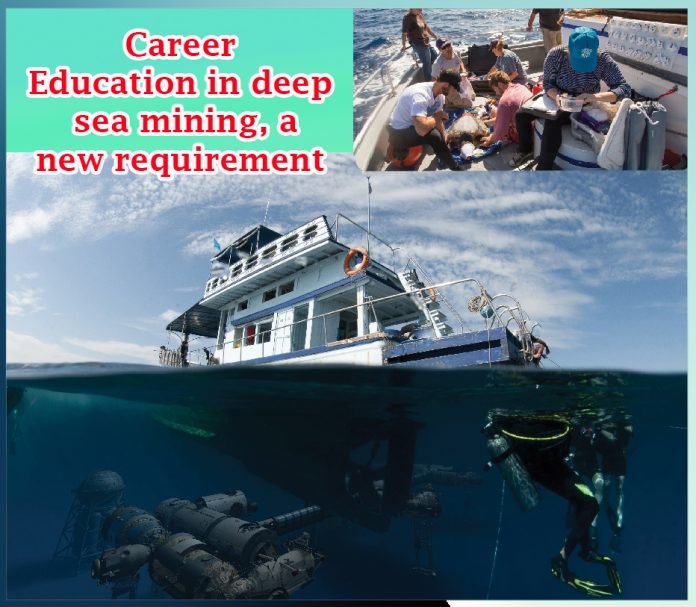There is a big treasure of minerals hiding in the ground.
These minerals have been made of many chemical reactions, which are being utilized for many works and production by the man after mining from the ground. There is no limit to earth mining: surface mining.
Before the mining operation is launched, source of the minerals are found out. There is coal, iron ore, manganese, bauxite many other minerals present under the earth. It is, however, important to note that nearly 70 percent of these minerals are destroyed or wasted during the process of digging them out.
Mostly, the mines are under government’s control and the government gives contract for mining for a fixed percentage of income. It is an alarming fact that the mafia-raj prevails in the area of mining. The illegal mining also is increasing day-by-day where as in foreign countries, there are strict laws on surface mining which apply specially to coal and iron ore mining.
The earth scientists say that the mining of mountain creates a lot of problems in the atmosphere. During mining, the valleys are formed in which rain water gets filled and ecological system also gets de-stabilized. Its effect has been seen on the level of ground water.
Today, Indian government has banned many mining projects so that natural atmosphere may be saved, in which the Western Ghats and Delhi-Haryana belt of Aravali mountains, come. Keeping this thing in mind, these days, the stress is being given on the education of ‘deep sea mining’. Many companies are coming forward, in this. Gold, Copper, Cobalt, Manganese, Nickel and many expensive minerals will be drawn out by the process of mining because of which the ecological system is also alright and there is no harm to the atmosphere, too.
China and Russia are doing the most work in the deep sea mining. Their working area is in the Indian Ocean and the Atlantic Ocean.
According to a report, there is a big treasure of minerals in the sea whose mining every year will dig out millions of tonnes of different tyupes of minerals. In that, the quantity of copper will be the most.
On this subject, scientist of National institute of oceanography, Dr S.N.Gajbhiye says that the correct use of sea minerals would be when its knowledge is given to the children at the school and college level. Today, there are many opportunities in the employment field of ‘sea mining’ but most of the children are not aware about it. Those who know about it, they do not want to go in this field because they are not given proper education and that is why they do not understand the importance of this field.
There are many engineers in our country but very few students take interest in the field of oceanic science. This is also a matter of concern. As a result, even today the field of oceanic science is untouched. Cadre Abhishek Kankan says that any sea mining is based on a few rules so that we may get the benefits of that.
For this, more and more scientists and engineers are required to work with more efficiency in less time. Nuclear blasting and dredging, shattering by nuclear blasting, shat sinking by rotary drilling etc. are all the procedures of mining with best techniques.
- By doing deep sea mining via nuclear blasting and dredging and by separating the mineral materials and by depositing the sea sand, an island could be made.
- By doing shattering by nuclear blasting, the minerals of the sea will be tested. Later on, after seeing its quality, the mining would be done so that less time and less labor is used.
- Shat sinking by rotary drilling in tunnels are used to draw out the manganese. In the developed countries, this procedure is used to draw out the minerals from the sea. By this, the salty water can also be turned into sweet water. In Mumbai, the wastes of the drainage water are drawn out by this procedure and the clear water is thrown into the sea. Deep sea mining is a new concept and therefore while doing this, it is necessary to take special care of some things. To work in this field, it is necessary to take training from good institutes.Dr. Gajbhiye says that while mining at the base of the sea, it is necessary to follow a few rules:
- At one place, continuous mining affects the benthick layer below the sea which may increase the possibility of poisoning of water and may endanger the sea creatures.
- Apart from this, in the mining field many chemicals come out due to leakage, spills, scobs etc., therefore, it is necessary to clean the place of mining after digging out of the minerals. At the same time, after mining for once, the minerals should be dug out and the remains should also be taken out so that the water is saved from being polluted. Deep sea mining is expensive.
- In the seabed, different minerals are in different layers. For example, at a depth of 4 to 6 thousand meters, copper, Nickel, cobalt and manganese, and at a depth of 800 to 2400 meters, Vanadium, Platinum, and mozibedinum and at a depth of 1400 to 3700 meter Lead, Zinc, Gold, Silver etc. metals are found. In sea. Diamond is also dug out from more depth.
A few institutes which provide education in deep sea mining engineering are:
Bengal engineering college, West Bengal- BE.
- Botanical Garden, Howrah-Metallurgy.
- Indian Institute of Technology-B.Tech., M.Sc.
- Bhave university of Technology, Bihar.
- Indian school of mines, Dhanbad.
- Engineering college, Rourkela, Odisha.
- Banaras Hindu University- Institute of Technology.
- Nagpur University, Chandrachoor Engineering College
- Maharashtra Institute of Technology, Pune.
- Anna University, College of Engineering, Gundi, Chennai.
- College of Technology and Engineering, Udaipur.
- Golden Valley institute of Technology, Orgam, Karnataka.
Follow us on Facebook, Twitter, Instagram, YouTube to get more updates related to Sachi Shiksha Spiritual – The Famous Spiritual Magazine in India.























 Bengal engineering college, West Bengal- BE.
Bengal engineering college, West Bengal- BE.





















